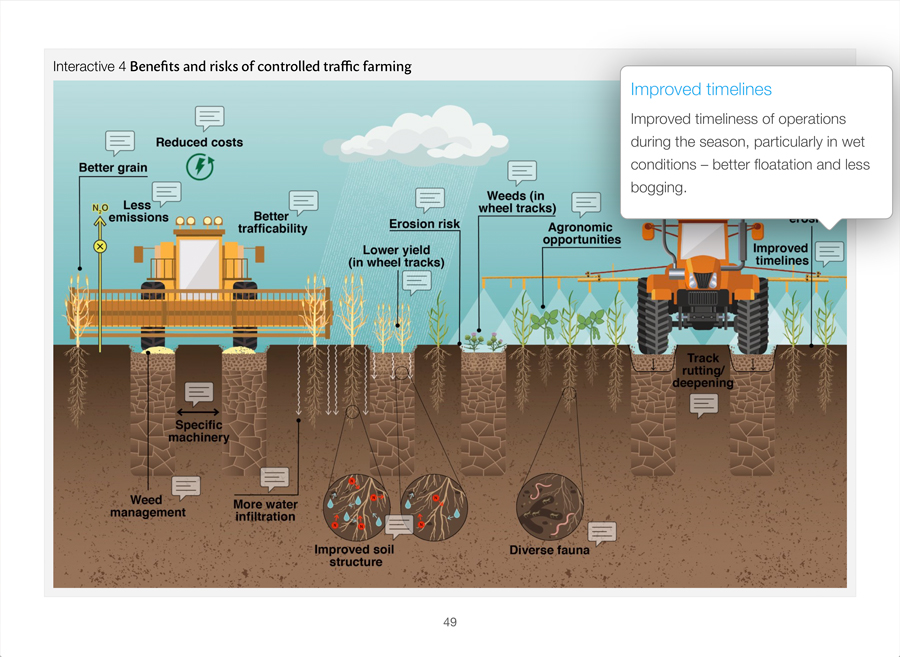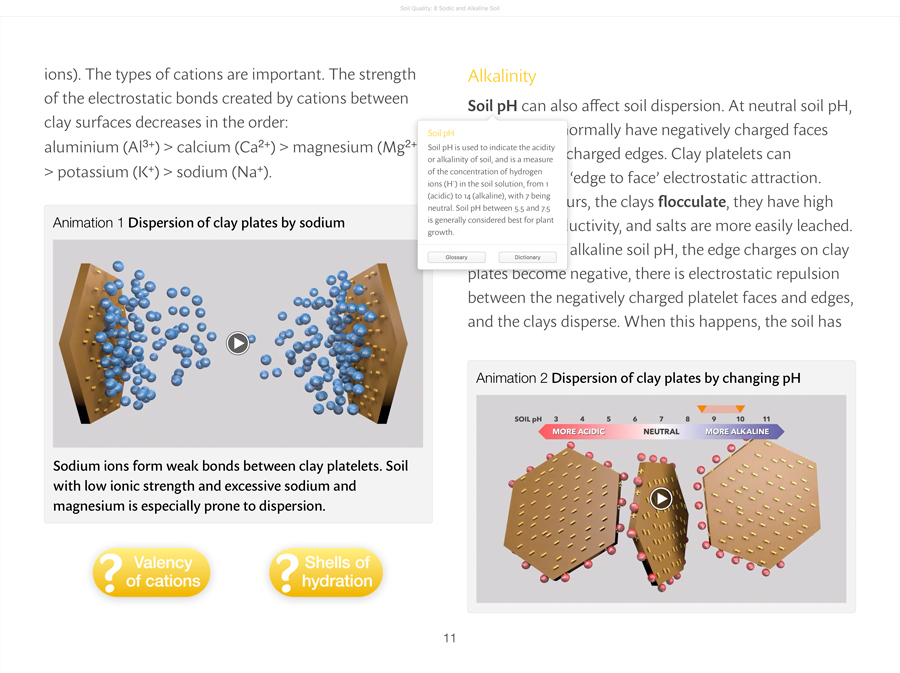Wisdom resides not only in written form but also in the heads of our elders – and, historically, in a multitude of filing cabinets.
This was a realisation for Associate Professor Frances Hoyle and Professor Daniel Murphy, the driving forces behind the SoilsWest series of educational and interactive soil quality ebooks.
“We developed the Soil Quality ebook series recognising there was fragmentation of knowledge across institutes and scientists, a need for translation of research to support decision-making – and, in some cases, to combat misinformation around knowledge of soil quality,” Associate Professor Hoyle says.
The ebooks compile the most recent evidence-based science on soil quality and translate it for easy application by growers, advisers and students in a free-to-access download.
“They draw upon a wealth of scientific published information, knowledge from dedicated soil science practitioners, industry perspectives and first-hand experience of growers.”
Eight ebooks are available in the series, covering constraints to plant production, integrated soil management, soil organic matter, acidity, biology, water repellence and sodic and alkaline soil. A further two are in development for 2023, covering plant nutrition and gravel soils.
Concept
“Soil underpins future food, feed, fibre, fuel and climate resilience – right down to the foundations of our sporting grounds and natural ecosystems. Bringing together the collective knowledge enables us to both recognise the inherent value of soil, but also to manage this resource for the future of our planet,” Associate Professor Hoyle says.
The soil quality information in the ebook series has been compiled to provide landholders, industry and students the state of knowledge and practical strategies on identifying, managing and integrating solutions to manage the soil resource with a focus on agriculture in the south-western agricultural region of Western Australia.
The ebooks bring together a collective of science experts and practitioners to step through the process of identifying constraints, understanding soil processes, determining impact and integrating management.
“The logical, problem-solving structure used throughout the ebooks allows readers to dig deeper for more information and explore the interactivity. Animations help visualise complex scientific theories, and different layers of information through the ‘learn more’ sections including infographics, video, audio options and illustrations help the reader to learn more intuitively.”
The soil science knowledge is put into action in the ebooks via grower case studies and imagery, with leading regional industry perspectives providing context and relevance (see examples in Figures 1 and 2).
Figure 1: An example of an interactive infographic from Soil quality 6: soil compaction. Readers can explore the benefits and risks of controlled-traffic farming by clicking on the text bubbles (one is shown popped out).

Source: Bindi Isbister and Wayne Parker (concept), Ooid Scientific (illustration)
The peer-to-peer learning concept has great value – often stepping growers through a process of implementation to address a known constraint.
The initial ebook concept was supported with co-investment by GRDC using the Apple Books platform. SoilsWest has led the publication of the series with development by Science with Style, and significant support from the Department of Primary Industries and Regional Development, Murdoch University and the University of Western Australia. Many other industry and research contributions are recognised in each book.
Once downloaded to a device, the ebooks are completely self-contained and do not require a connection to the internet.
Ryan Borrett, SoilsWest’s science communications coordinator, says the ebooks are a significant legacy.
“The ebook format has enabled us to cater to a suite of different learning styles – reading, listening and viewing, which can be done in any location, even on the go in a tractor,” he says.
The ebooks are about science for a purpose. They foster curiosity and are intuitive to use. They support farming sustainably and provide guidelines to look after our soil, which is a critical resource. The ebooks are standalone publications that will be updated, and more added over time – in this respect, they are a ‘living’ resource.
Figure 2: Content example from Soil quality 8: sodic and alkaline soil. Animations of soil dispersion and a pop-up glossary explaining soil pH.

Source: Ed Barrett-Lennard (concept), Red Empire (animation)
Content
Soil quality 1: constraints to plant production sets the scene and provides an overview of the major soil quality constraints or properties, with a focus on managing soils to increase the efficiency with which we utilise rainfall and maintain soil function.
Soil quality 2: integrated soil management provides information on managing multiple soil constraints in a farming system. Information moves through identifying and prioritising soil constraints, and options for managing multiple constraints; to detailed discussions on managing typical soil types and their common constraints.
Soil quality 3: soil organic matter provides a detailed understanding of the role and functioning of soil organic matter in farming systems, including the implications of a wide range of agricultural management practices.
Soil quality 4: soil acidity covers the causes and implications of soil acidity in broadacre agriculture. Diagnosis and management guidelines are supported by current research results and farmer case studies.
Soil quality 5: soil biology includes information on beneficial and disease-causing organisms and the influence of the environment and management on soil habitats which impacts soil production and resilience.
Soil quality 6: soil compaction explains the causes, effects, diagnosis and management of compaction in agricultural soil.
Soil quality 7: soil water repellence explains the impact, expression, diagnosis and management of water repellence in agricultural soil.
Soil quality 8: sodic and alkaline soil outlines the complex nature and extent of managing sodic and alkaline soil, which make up about 60 per cent of the 18 million arable hectares in Western Australia.
Ebooks for plant nutrition and gravel soils are underway for 2023 to make 10 ebooks in the series.
The science and case studies underpinning these ebooks, while predominantly focused on Western Australia, are relevant nationally and globally and provide a valuable resource for a wide audience.
From the lay person wanting to understand why soil is important to them, to the grower wanting to build resilience within their farming business, and to the policy adviser addressing climate change and food security – these books provide an important resource of evidence-based information through which change can be driven.
“It is critical that we understand and develop strategies to optimise the influence of the environment and management on soil habitats (and vice versa) to sustain its critical functions,” Associate Professor Hoyle says.
“The ebooks are all about better resource use, minimising inputs and cost and increasing the productivity and resilience of our soil resource.”
More information: SoilsWest books are available for free by downloading on iPad, iPhone, or Mac computer from Apple Books.

























































